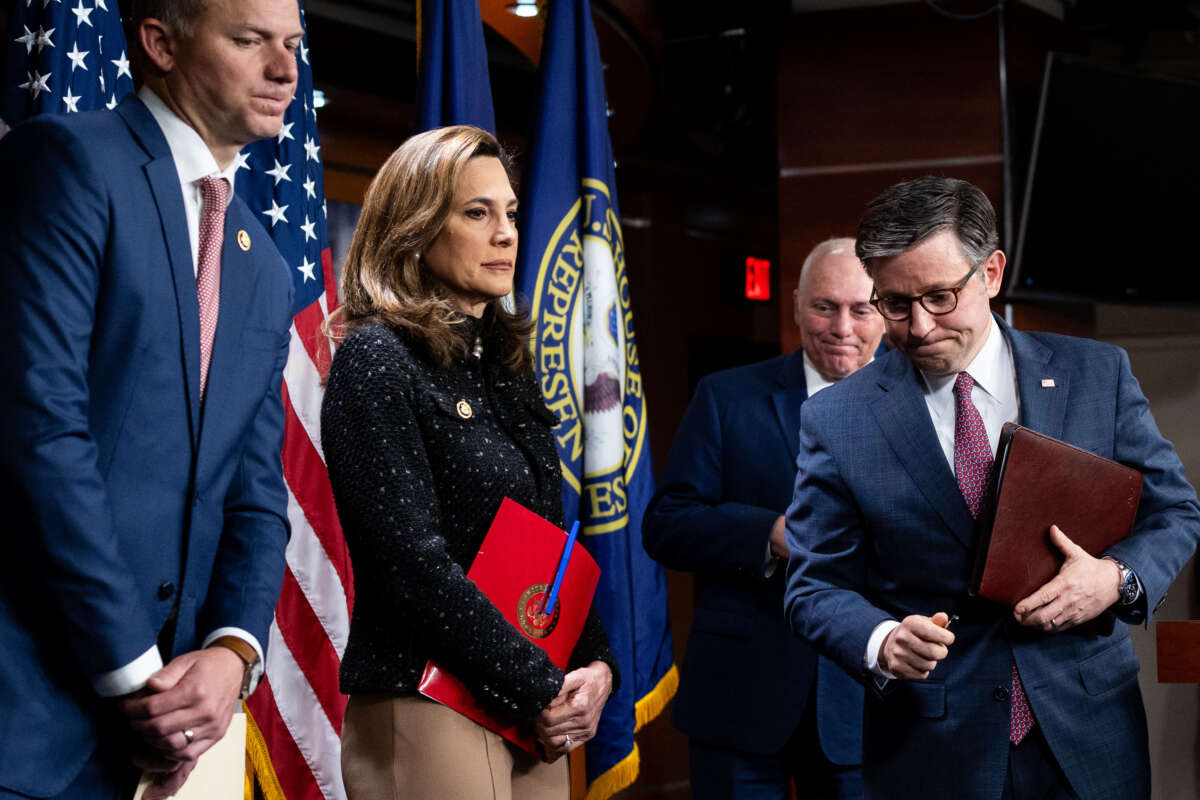The U.S. House is expected to vote Friday on legislation to reauthorize a surveillance authority that intelligence agencies have heavily abused to collect the communications of American activists, journalists, and lawmakers without a warrant.
Friday’s vote will come after House Republicans earlier this week blocked Speaker Mike Johnson’s (R-La.) attempt to advance legislation reauthorizing Section 702 of the Foreign Intelligence Surveillance Act (FISA), which allows U.S. agencies to spy on non-citizens located outside of the country.
The FBI and NSA have regularly used the spying authority, which is set to expire next week, to obtain the communications of U.S. citizens, sparking a bipartisan reform push.
The legislation the House is set to consider Friday would reauthorize Section 702 for two years instead of five. Lawmakers will also vote on several amendments, including three from the House Permanent Select Committee on Intelligence (HPSCI) that would expand the spying authority.
“The first amendment would put in place the largest expansion of domestic surveillance since the Patriot Act… and I don’t say that lightly,” Elizabeth Goitein, co-director of the Liberty and National Security Program at the Brennan Center for Justice, wrote on social media late Thursday. “It would hugely inflate the universe of companies required to assist the government in conducting surveillance.”
Another amendment, she noted, would permit “suspicionless searches for the communications of non-U.S. persons seeking permission to travel to the U.S., even if the multiple vetting mechanisms already in place have revealed no cause for concern.”
The underlying legislation, titled the Reforming Intelligence and Securing America Act, “would do nothing to prevent abuses of Section 702, and it would actually weaken the FISA Court’s oversight of surveillance,” Goitein wrote.
The House will vote on Section 702 TOMORROW MORNING. If you think warrantless surveillance should be reined in rather than massively expanded, PLEASE USE THIS CALL TOOL ASAP (click below or call 202-899-8938) & leave a message if you get VM. 1/21 https://t.co/HAOHURZoJQ
— Elizabeth Goitein (@LizaGoitein) April 12, 2024
Members of the House Judiciary Committee, meanwhile, will offer an amendment that would require U.S. intelligence agencies to obtain a warrant before surveilling American citizens’ communications under Section 702 — a change opposed by the Biden White House.
The Congressional Progressive Caucus (CPC), led by Rep. Pramila Jayapal (D-Wash.), formally endorsed the amendment on Thursday after a membership vote. More than two-thirds of the CPC’s membership voted in favor of endorsing the amendment.
“In 2022 alone, the FBI exploited Section 702 more than 200,000 times to search for Americans’ data, circumventing the Fourth Amendment and betraying public trust,” the caucus said in a statement. “These searches unjustly targeted individuals, including Members of Congress, 141 Black Lives Matter protesters, 19,000 donors to a congressional campaign, a local political party, tens of thousands of people involved in ‘civil unrest,’ visitors to FBI offices, and individuals based solely on their race. The House has voted multiple times to end this practice of performing backdoor searches on Americans with strong bipartisan support.”
Jayapal wrote earlier this week that Congress “must reform Section 702 to include a warrant requirement if the intel community wants to spy on Americans. Period.”
The House’s latest attempt to extend Section 702 comes after Rep. Mike Turner (R-Ohio), the chair of the HPSCI, attempted to tip the scales in favor of continued warrantless spying by warning of a “serious national security threat” in an ominous February statement.
It quickly became clear that the Ohio Republican’s statement referred to U.S. intelligence — gathered with Section 702 authority — indicating that Russia has made significant progress on a space-based nuclear weapon purportedly designed to target American satellites, which lawmakers have known about for years.
“Unfortunately, the House Intelligence Committee has tripled down on misleading their colleagues and pushing forward Patriot Act 2.0, all while fighting to expand suspicionless digital strip searches of immigrants and the already extremely broad definition of foreign intelligence information,” Sean Vitka, policy director of the advocacy group Demand Progress, said in a statement ahead of Friday’s vote.
Vitka expressed support for the House Judiciary Committee amendment, saying it would “create the first meaningful privacy protection against Section 702 spying since its enactment.”
“We will continue to ensure that everyone in Congress knows that their constituents demand it,” Vitka added.
Media that fights fascism
Truthout is funded almost entirely by readers — that’s why we can speak truth to power and cut against the mainstream narrative. But independent journalists at Truthout face mounting political repression under Trump.
We rely on your support to survive McCarthyist censorship. Please make a tax-deductible one-time or monthly donation.
